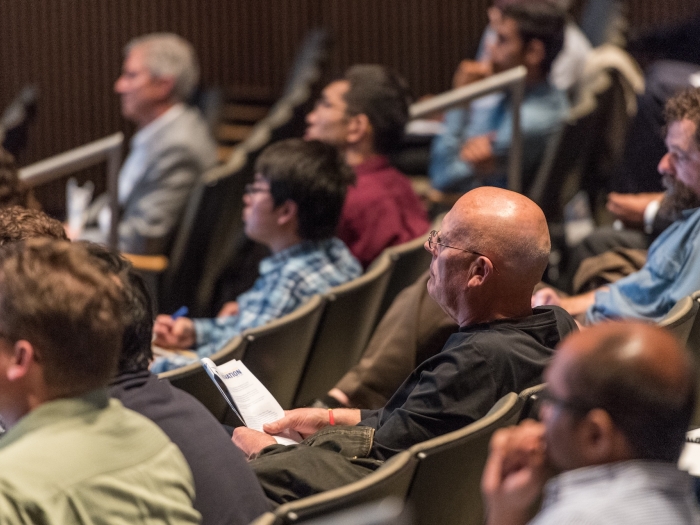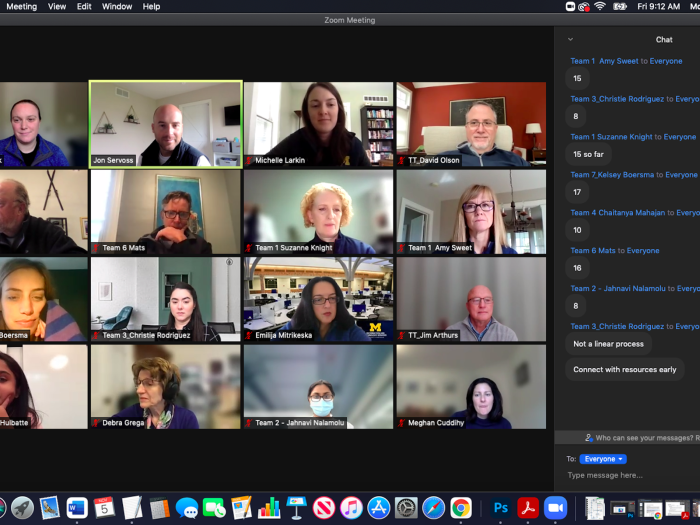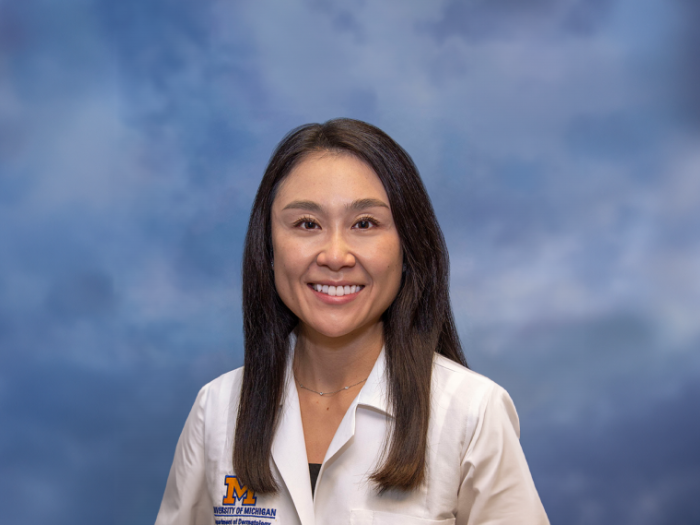Whether you’re new to research or a veteran scientist, you can take advantage of the vast array of knowledge and talent throughout the Medical School and across campus.

In partnership with the Medical School Office of Research, the U-M Office of Research & Sponsored Projects, U-M Foundation Relations, and Michigan Medicine Corporate & Foundation Relations, the U-M Library maintains the Research Funding & Grants Guide, a one-stop-shop for research funding resources. The site is a central, campus-wide portal for finding internal and external funding opportunities and for consultations on how to personalize your search and stay informed. Not sure where to start? Schedule a consultation with an Informationist. The U-M Library also offers training events throughout the year.
Research Development coordinates internal competitions for limited submission grants to foundations, where all opportunities are hosted on the Medical School Competition Space. They also manage the bridge funding program via the Biomedical Research Council (BMRC), which helps support continuity of faculty research between grants.
The Michigan Medicine Corporate and Foundation Relations team can assist in the funding process, including providing direct communication with the funding entity to obtain guidance on project appeal/applicability to the funder, providing examples of previously funded U-M proposals, and answering general faculty questions. For a wide range of Foundation and Corporate funding opportunities, please visit their Foundations Competition Space.
For more information on finding funding, visit the Funding & Proposal Development page.
Fast Forward Medical Innovation (FFMI) gives researchers valuable guidance and support as they navigate the path to successful commercialization. FFMI hosts various (link is external)commercialization events throughout the year.
Are you a researcher with an innovative idea that could impact health? Schedule an Idea Consultation.
Research Development hosts multiple grant writing workshops throughout the year. These workshops often cover writing grant proposals for all types of grants, including NIH, NSF, and foundations. To view the current workshops, visit the Events & Workshops page.
The Office of Faculty Affairs & Faculty Development aims to support faculty skill acquisition in teaching, research, and leadership as well as navigating the complex organizational structures in which they practice. Towards this goal, they offer multiple trainings and workshops throughout the year with regards to research and scholarship. For more information, view their upcoming workshops.
Research Development Core consultations through the Michigan Institute for Clinical & Health Research (MICHR) provide personalized support and advice for your grant proposals or research ideas. Their FREE one-hour in-person consultations can help you improve your research and funding success and are available to any researcher at the University of Michigan. For more information, visit their Research Development Consultations page.
Research Development maintains a list of freelance editors and freelance graphics specialists. You may contact these individuals directly for freelance work for various types of writing, e.g., grant proposals, manuscripts, IRB applications, dissertations, or graphic design and medical illustration. Please refer to the individual’s CV/resume for more information about his or her expertise and experience. If interested, please contact the editor to negotiate the work statement and payment arrangements.
The Mock Study Section event, offered through the Michigan Institute for Clinical & Health Research (MICHR), helps participants understand how NIH grant reviewers think. Participants will discuss actual twelve-page K and R grants (already submitted in some version to the NIH), learning what happens behind the closed doors in a real K or R grant review. It simulates an NIH study section in every detail (including the work expected). Participants will be assigned a grant to review in either clinical and translational research or health services research. For more information, visit their Mock Study Section page.
The three-part K Writing Workshop series, offered through the Michigan Institute for Clinical & Health Research (MICHR), will help participants get peer critique and feedback from senior faculty who are experienced in NIH study section thinking. Participants should be currently writing or preparing to write a K Award grant, as they will exchange drafts of their proposals during the sessions. This series usually takes place in the fall. For more information, visit their K Writing Workshop page.
The MICHR Pre-KL2 Award (also known as the J award) is a multidisciplinary career development program designed to prepare clinician scientists for beginning the process of developing independent careers in translational research. Each awardee receives $85,000 over two years to carry out their translational research. Participants are prepared to go on to apply for the MICHR K Award or their own independent K Award.
Research Development's R01 Boot Camp is a multifaceted program designed to help faculty members receive their first R01 grants from the NIH. Senior faculty with strong track records of NIH funding guide groups of mentees through the proposal development process, while the team structure encourages peer support and feedback. This 9-month program runs from September to March each year.
The Program Accelerating Commercialization Education (PACE) from Fast Forward Medical Innovation helps innovators become familiar with the product development and entrepreneurial arenas. PACE provides valuable mentorship and offers a deep, real-world examination of strategy and tactics helping participants gain valuable insight into successfully translating research to market.
The Office of Faculty Development has developed a comprehensive, competency-based curriculum to meet the challenges associated with research, teaching, and managing in the academic health care environment. Development opportunities include courses with specific learning objectives, mentoring education and support, and on-site, customizable programs.
U-M follows federal, state, and university guidelines regarding Responsible Conduct of Research (RCR) training for principal investigators, key personnel, and students. The RCR guidelines may apply to a specific type of research compliance (e.g., conflict of interest, animal care and use, human subjects protection) or to topics related the proper conduct of research (e.g., authorship).
The U-M Environment, Health & Safety (EHS) website contains menu options to view courses, requirements for safety training (e.g., laboratory, radiation, protective clothing), and contact information. If you work in a research laboratory or are responsible for those working in a lab, you will need to take one or more compliance courses from EHS.
IRBMED’s Education Program was designed and developed through collaboration with members of the research community. They offer a variety of educational opportunities, both in-person and online. View the current education programs below.
U-M's IRBs are committed to providing educational materials online, as well as in the classroom. U-MIC presentations are short videos and voiceover slide shows that address topics relating both to ethics in human subjects research and to IRB procedures. To view the the more than 70 presentations, visit the U-MIC page.
U-M's online Program for Education and Evaluation in Responsible Research and Scholarship (PEERRS) offers two courses that fulfill regulatory requirements for training in the protection of human subjects in research. U-M employees and students have access to the PEERRS menu in U-M's My LINC training system via their uniqname and UMICH (level 1) password. Completion of at least one of these courses is a requirement for IRB approval.
- Human Subjects Protection - Biomedical & Health
- Human Subjects Protection - Social & Behavioral
For more information, visit the Human Research Protection Program Education Resources page.
As a U-M investigator or research staff working on a human subjects study, you are expected to following the federal, state, and university policies regarding the protection of human subjects. The HRPP Operations Manual outlines the U-M policy in detail. For more information, visit the Human Research Protection Program page.
Maintaining a comprehensive training and education program is essential to the University’s ongoing commitment to sustained excellence and compassion in animal care and use. Accordingly, all personnel who work with animals in either research, testing, or teaching receive training in the proper care and use of research animals PRIOR to beginning their work.
To ensure that procedures are conducted by experienced and qualified personnel, and that the highest animal welfare standards are maintained at all times, the Institutional Animal Care & Use Committee (IACUC) requires that certain animal care and use training classes be completed based on the specific tasks listed in an animal use protocol. For more information, visit the Animal Care & Use Training page.
Offered by the Medical School's Office of Regulatory Affairs, the ClinicalTrials.gov hands-on training sessions provide instruction on how ClinicalTrials.gov can be used at various stages of the proposal development process.
The Michigan Institute for Clinical & Health Research (MICHR) offers regulatory support training and education throughout the year. To view their current resources, visit their Regulatory Support page.
U-M offers two options for basic good clinical practice (GCP) training for clinical trial study team members:
- For biomedical clinical trails, U-M offers GCP training through the Collaborative Institutional Training Initiative (CITI). To access the CITI GCP course, you must first create a CITI account (free) and affiliate with the University of Michigan within CITI.
- For social/behavioral clinical trials, the Michigan Institute for Clinical & Health Research (MICHR) offers the NCATS Social and Behavioral Best Practices course in My LINC. All U-M employees and students have access to U-M's My LINC training system through their uniqname and UMICH (Level 1) password. See the My LINC step-by-step instructions for details on how to register for the MICHR GCP course.
Orientation for Clinical Investigators provides faculty with an overview of information, resources, and tools necessary to comply with regulations related to clinical research and will help efficiently navigate the University’s research enterprise. This seminar is for faculty new to the institution or new to clinical research, and there is no charge to the participant or department for participation.
Participants will learn about IRBMED, regulatory affairs, conflict of interest, audits and monitoring, ClinicalTrials.gov, clinical research finances, and U-M resources for clinical trials research. For more information, visit the CTSO Training & Education page.
All clinical research projects serviced by the Clinical Trials Support Office are managed in OnCore, an enterprise Clinical Trials Management System (CTMS). The OnCore Central Support Team provides support and training to help the clinical trials community transition to OnCore. Each OnCore training session provides hands-on training to allow staff and faculty to practice with the functions they will frequently use. OnDemand OnCore Training Videos are also available. To view all OnCore training resources, visit the OnCore Accounts & Support page.
The Department of Internal Medicine’s Clinical Trials Academy offers early-career faculty and new clinician investigators a combination of lectures and hands-on small group sessions to teach the complex and changing landscape of clinical trials. The academy will teach practical tips to succeed including targeting cutting-edge basic research findings with relevant human disease, constructing the most pertinent hypotheses and questioning to catalyze innovation in drug/device discovery, teaching the fundamentals of clinical trial design, and understanding the changing landscape of clinical trials, from earlier phases to multicenter randomized and pragmatic population trials.
The Office of Research & Sponsored Projects offers a variety of training programs and workshops to help researchers and research administrators learn the ins and outs of research administration at the University of Michigan. For more information, visit the ORSP's Navigate page.
Cornerstone Learning is the University's online training tool offering high quality education solutions for Michigan Medicine faculty and staff.
MICHR's Research Basics Workshop series presents basic, introductory-level material covering concepts in clinical or health research. This three-part series engages participants and provides opportunities for skill building and learning. Sessions include:
- Fundamentals of Data Management
- Essential Documents and Good Clinical Practice
- Conducting and Obtaining Valid Informed Consent
1301 Catherine Street
Ann Arbor, MI 48109-5624
North Campus Research Complex (NCRC)
Building 520, 3rd Floor
2800 Plymouth Road
Ann Arbor, MI 48109-2800







